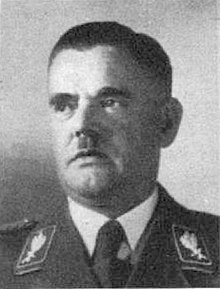Fritz Schwitzgebel
Friedrich Schwitzgebel , called Fritz Schwitzgebel (born September 19, 1888 in Waldmohr , † June 19, 1957 in Zweibrücken ) was a German politician ( NSDAP ) and Lord Mayor of Saarbrücken .
Life
After attending elementary school and high school in Zweibrücken, the son of an elementary school teacher studied modern languages in Munich , Strasbourg and Nancy after graduating from high school in 1908 . From 1912 to 1914 he was employed as a tutor in Folkestone , England .
From 1914 Schwitzgebel took part in the First World War as a war volunteer in the 22nd Infantry Regiment "Prince Wilhelm von Hohenzollern" of the Bavarian Army . In the further course of the war he was deployed as a reserve lieutenant in the 17th Infantry Regiment "Orff" and was awarded both classes of the Iron Cross , the Order of Military Merit IV class and the Wound Badge in black. In November 1918 he was discharged from the army.
He then became a community clerk in Mittelbach and from May 1919 studied English, Romance studies and geography at the Rheinische Friedrich-Wilhelms-Universität Bonn , and in 1923 passed the teaching examination. Since he refused to sign a declaration of commitment, the Inter-Allied Rhineland Commission refused him employment as a teacher in Zweibrücken. Finally he made his living at the Chamottewerke in Homburg and after his expulsion from the Saar area because of illegal political activity from January 1924 as an office worker in Gleuel . After passing two further teacher exams in 1924 and 1925, he was a main teacher at the secondary school in Zweibrücken until 1932 .
In January 1926 he joined the Sturmabteilung (SA) and the NSDAP ( membership number 28,464). From the beginning of December 1928 to the beginning of August 1934 he served as deputy Gauleiter. Until 1935 he was the leader of the Palatinate and Saarland sections of the SA, the SA Brigade 51 (Palatinate-Saar) and from 1934 also provisional of the SA Brigade 151 "West Palatinate". In November 1937 he was promoted to group leader (general) honorary in the SA. Schwitzgebel was a member of the Bavarian State Parliament in the 5th electoral term in 1932/33 . From November 12, 1933 until the end of Nazi rule in spring 1945, Schwitzgebel was also a member of the Reichstag as a member of the NSDAP with a mandate for constituency 27 (Rheinpfalz-Saar).
On March 1, 1935, Schwitzgebel was appointed senior councilor in the school department of the Reich Commissioner for Saarland . From 1935 to 1937, with long interruptions, he was district leader of the NSDAP in Kaiserslautern . In addition, in 1936 he took over the office of district and Gausport leader in the Nazi Reichsbund for physical education and became the local Gau inspector. On October 10, 1937, Schwitzgebel was appointed Lord Mayor of Saarbrücken as the successor to Ernst Dürrfeld , who had left because of alcohol problems , an office he held until he fled on March 20, 1945. During his tenure, he was deputy chairman of the supervisory board of Saar-Ferngasgesellschaft AG and also chaired the German Association of Saarpfalz. In 1938 he was made an honorary citizen of the city of Zweibrücken. After the annexation of Austria , he was the municipal commissioner of the “Reich Commissioner for the Reunification of Austria with the Reich” Josef Bürckel in Vienna until 1939 .
With the German occupation of Poland after the beginning of the Second World War , he held office from September 24, 1939 to May 31, 1940, i.e. at the time of the first evacuation of Saarbrücken, city governor in Radom . His district governor there was Karl Lasch . From 1940 to 1944 he was also head of the Forbach city administration and the Forbach administrative district in occupied Lorraine . From September 1941 to the beginning of July 1944 he was also acting district leader of the Saarbrücken-Stadt and Saarbrücken-Land districts.
Schwitzgebel was arrested and interned on July 13, 1945 after the end of the war. On October 22, 1948, he was classified in group I (“main culprits”) in the judicial chamber proceedings and sentenced to four years in prison. On April 14, 1949, he was released early from the Theley internment camp on condition that he leave the Saar Protectorate .
Since December 24, 1920, Schwitzgebel was married to the handicraft teacher Paulina Kurz , who was active as a functionary in the Nazi women's union from 1923 .
literature
- Hanns Klein: Short biographies of the mayors of (old) Saarbrücken, St. Johanns, Malstatt-Burbachs and the city of Saarbrücken. In: Journal for the history of the Saar region. XIX, Saarbrücken 1971, pp. 510-538. On Schwitzgebel p. 529f.
- Markus Roth: Gentlemen. The German District Chiefs in Occupied Poland - Career Paths, Rule Practice and Post-History. Wallstein Verlag, Göttingen 2009, ISBN 978-3-8353-0477-2 .
Web links
- Fritz Schwitzgebel in the database of members of the Reichstag
- Fritz Schwitzgebel in the Saarland biographies
- Fritz Schwitzgebel in the parliamentary database at the House of Bavarian History
- Entry on Fritz Schwitzgebel in the Rhineland-Palatinate personal database
- Joachim Lilla : Schwitzgebel, Friedrich (Fritz). In: ders .: Minister of State, senior administrative officials and (NS) functionaries in Bavaria from 1918 to 1945.
Individual evidence
- ↑ Short biography with Markus Roth: Herrenmenschen , p. 504.
- ↑ Entry on Paulina Schwitzgebel in the Rhineland-Palatinate personal database , accessed on April 16, 2016 .
| personal data | |
|---|---|
| SURNAME | Schwitzgebel, Fritz |
| ALTERNATIVE NAMES | Schwitzgebel, Friedrich |
| BRIEF DESCRIPTION | German politician (NSDAP), Member of the Bundestag and Lord Mayor of Saarbrücken |
| DATE OF BIRTH | September 19, 1888 |
| PLACE OF BIRTH | Forest black |
| DATE OF DEATH | June 19, 1957 |
| Place of death | Zweibrücken |

